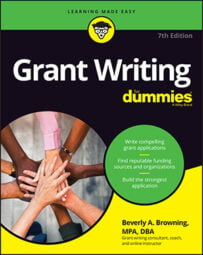When a grant is awarded, it’s awarded in good faith and based on both your budget request and the funding source’s grant-making capacity. So, your first goal in developing the budget section of your application narrative is to fine-tune your budget request to reflect the actual costs of your program needs. Your second goal is to get your program funded in full, of course!
Gathering accurate cost figures
Not sure what kind of budget numbers to put down? Can’t figure out how much you’ll have to pay a program director? Unclear how much you’ll have to spend on a copy machine? Here’s an easy solution: Use your telephone. Call the United Way in your area, for example, to find out its salary ranges for program directors, program coordinators, clerical support, accounting clerks, and other staff positions. Call vendors for specification sheets on equipment. It’s amazing how quickly you can find answers by asking people in the know!The Internet has a wealth of information on nonprofit organizations, including salary surveys. Run a quick Internet search, using your favorite search engine, for nonprofit salary surveys.
Network with other organizations in your community to locate purchasing cooperatives. With these co-ops, multiple agencies get together to place orders for like items in bulk, thus receiving a bulk purchase discount. All the members of the cooperative benefit by reducing their overall operating costs. Take notes and create a cooperative purchasing information file so you know whom to call or email for future cost-sharing opportunities.
Funders often call applicants to get more information on a line item. So be prepared!
Including all possible program income
If you anticipate having any program income at all, you must list a projected amount at the end of your budget summary table and subtract it from the total project costs; doing so means you need less money in grant funds. Examples of possible program income include the following:- Interest: You may earn interest on endowment funds you’re allowed to use annually to assist with program costs.
- Membership or program fees: A public library has late fees that add to its overall program income, for example. Likewise, a program may charge participants a small fee to enroll in program classes or services.
- Special events revenue: You may be planning to hold a fundraising auction or raffle to collect additional monies for field trips, equipment, or other items or activities in the project’s design.
- Ticket sales for planned events: You may work within a performing arts organization that puts on three plays at the local community theater, and patrons purchase tickets to see your troupe perform.
- Tuition: You may receive payment or reimbursement from a state or local agency for aiding a specific population. Your grant request may be for monies to develop additional programs, but you must account for the monies you already take in.
Not reporting your income is unethical. Just think about the dozens, hundreds, or thousands of proposals a funder receives daily, weekly, and monthly. Ninety percent of the time, the funding source must send out letters to grant seekers regretfully stating that not enough funds are available to fund all the requests received.
If you choose to omit the fact that you expect program income and greedily ask for the whole ball of wax, you’re taking thousands of dollars out of the funder’s annual grant-making budget. Your excess could have funded another grant, perhaps for a struggling start-up agency with no other resources. From an ethical standpoint, asking for grant funds means taking a private oath never to ask for more than you actually need.Managing expenditures to the penny
Asking for too much isn’t looked upon favorably by any funding source. In fact, giving leftover money back at the end of the grant period may mean you can’t go back to that funder, ever. No funder wants money back. Why? The funder has already worked the grant award or allocation into its annual giving budgets. Returned money is a hassle, from accounting to reallocation, if the funder has a specific amount of grant funds it awards annually.To top it off, giving grant award money back may send one or more of these signals to funders:
- Your organization (the grant applicant) didn’t submit an accurate budget request — you overshot some of the line items and now you have more money than you know what to do with!
- You aren’t creative enough to find a way to use the leftover monies in your project to better serve the target population.
- You failed to carry out all the proposed activities and had leftover monies.
- Meet with your board of directors or project advisory council to brainstorm how you can (legally) spend the monies on project-related needs.
Funders are often willing to work with you if you truly have a legitimate or unavoidable reason for not spending the grant funds as planned. Contacting the program officer as soon as possible when such issues arise is much better than having to send a check back at the end.

